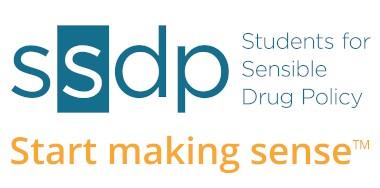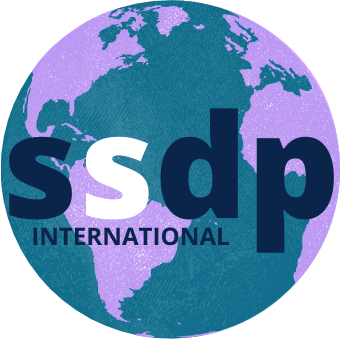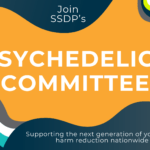Written by Emma Landry ‘21 and Avery Meyer ‘21, Johns Hopkins University SSDP Co-Chapter Leaders
1. How did you hear about SSDP?
Avery: I have heard about SSDP over the years vaguely, but became really interested when I talked to someone who was involved in SSDP and spoke really highly of the organization and connections it allowed her to make.
Emma: Over the last year, I have gotten a lot more involved in online spaces such as Twitter to talk about drug policy, harm reduction, and related topics. A few of the people I’ve been able to network with are involved with SSDP, and so I would often see and read posts about the work SSDP was doing around drug policy, which was what initially sparked my interest in the organization.
2. Why did you want to get involved/what made you decide to start a chapter?
Avery: I knew JHU would be a great place for an SSDP chapter, and as a public health student I knew we could garner a lot of members and diversity of interests and abilities to help with the organization’s goal. Baltimore City has some new progressive policies that also make the city a good place to do this kind of work. I am passionate about a wide variety of policy areas related to ending the war on drugs and working with an org so well run like SSDP is really exciting!
Emma: Before moving to Baltimore in August, I knew one of my main goals for my first semester at Hopkins was to start a student organization focused on drug policy reform since there was no such group already on campus. SSDP’s mission closely aligned with my own aspiration of ending War on Drug policies in Baltimore, and I thought SSDP’s network, resources, and international support would be a great way to catalyze concrete drug policy changes in Baltimore and surrounding areas.
3. What has the reception been like on campus? From students, teachers, administration, etc.
Avery: I sent a message to my cohort of ~65 people and over half responded with interest! I knew we would get lots of interest, especially as drug policy and general justice reform becomes more prevalent which is really exciting.
Emma: So far all of the undergraduates I’ve talked to on campus have been thrilled about the idea and most have reached out to get involved with our work this year. I think whether it’s actual drug policy reform, advocacy to end mass-incarceration, or the economic costs of the War on Drugs, students from all different majors/academic backgrounds are showing interest in supporting SSDP’s mission.
4. What are some of the things you have planned or want to plan for next semester?
Avery: Since we are just starting out, I really want to get a grasp on what people in the chapter are interested in working on and try to balance our plans around those interests.I think some initial ideas would be looking at availability of naloxone on campus, working with JHU’s student government to see about changes to the medical amnesty policy, and partnering with the many orgs in Baltimore City doing amazing harm reduction and drug policy work.
Emma: I’m excited to see what our chapter members are passionate about so we can center our efforts around a common goal everyone is dedicated to achieving. On campus, I hope to increase science-based education on drug use and access to harm reduction resources (e.g. narcan). Beyond Hopkins, there’s many important policy efforts in Baltimore to support, such as the legalization of marijuana and the push to dismiss all criminal charges for possession.
5. What is the most challenging part of your experience starting/running the chapter so far?
Avery: I think trying to pick where to start…there are so many topics of interest related to drug policy and we will get a diverse interest from our group so trying to keep it organized but applicable to everyone could be challenging. The initial steps of getting in contact with other orgs will probably be a bit challenging in the beginning too, but worth it in the long run!
Emma: For me, it’s realizing you can’t do everything at once. There are so many changes I’d like to see happen, but it’s important to remember change doesn’t happen overnight and taking on 100 different policy or advocacy projects at once will ultimately hinder the later success of our chapter. Setting small, tangible goals each day and steadily increasing the scope of our work is key!
6. What is the most rewarding part?
Avery: A sense of community and support is important when working in a field that can be as challenging as drug policy, and the support from the SSDP contacts has been really helpful. I hope to foster this sense of support as we get the chapter going.
Emma: Getting to learn about others and their experiences! It’s rewarding to see peoples’ voices elevated who have directly experienced the negative impact of the War on Drugs –there is so much we as a society have to learn from their stories.
7. What are you most excited about for your chapter/school/state/region right now?
Avery: I am excited to hopefully work with JHU’s student government to address some of the campus policy that aren’t in line with a mission to dismantling the War on Drugs. In Baltimore and Maryland there is a lot of exciting work regarding not prosecuting possession charges and decriminalizing paraphernalia and being able to connect with orgs working on that will be great for SSDP!
Emma: I am excited to research how policies on Hopkins’ campus can be improved to create a safer environment for students and equip them with skills to keep others safe in environments where drugs are present. Further, the conversation about decriminalization in Baltimore is really gaining traction, so I am eager to get involved in the extraordinary work different organizations are doing in the area.
8. What is your vision for your SSDP? Where do you see your chapter in a year? in 4 or 5 years?
Avery: I really hope that this chapter of SSDP provides a supportive environment for students who use drugs and/or are interested in drug policy reform with a mission to effect change from the university to state level. In a year, I see us well connected with the community of Baltimore and creating partnerships within the university. In 4-5 years I will likely not be at JHU so I would hope the chapter’s structure is strong enough to have new leadership to keep on SSDP’s mission and mold to new interests in the JHU community!
Emma: Ultimately, I hope that SSDP will create an environment on campus for students and faculty to have open and honest conversations about substance use, and for the Hopkins community to have a deeper understanding of the history of the War on Drugs and how it’s shaped our current policies. I envision SSDP being a bridge connecting Hopkins students and the community of Baltimore to work in unison on reforming current drug policies to ones that are grounded in science and compassion.










